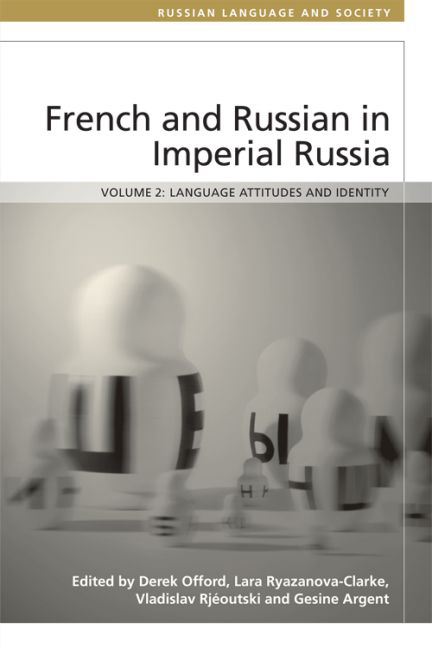Book contents
- Frontmatter
- Contents
- Preface
- Note on Dates, Transliteration and Other Editorial Practices
- Abbreviations Used in the Text, Notes and References
- Dates of Reigns in Eighteenth- and Nineteenth-Century Russia
- Dedication
- Introduction
- 1 The Pan-European Justification of a Multilingual Russian Society in the Late Eighteenth Century
- 2 Princess Dashkova and the Politics of Language in Eighteenth-Century Russia
- 3 Plating ‘Russian Gold’ with ‘French Copper’: Aleksandr Sumarokov and Eighteenth-Century Franco-Russian Translation
- 4 Francophone Culture in Russia Seen through the Russian and French Periodical Press
- 5 Linguistic Gallophobia in Russian Comedy
- 6 The Linguistic Debate between Karamzin and Shishkov: Evaluating Russian–French Language Contact
- 7 Language and Conservative Politics in Alexandrine Russia
- 8 Seduction, Subterfuge, Subversion: Ivan Krylov's Rewriting of Molière
- 9 The French Language of Fashion in Early Nineteenth-Century Russia
- 10 Russian ‘Translations’ of Patrie in the Napoleonic Period
- 11 Treatment of Francophonie in Pushkin's Prose Fiction
- 12 Love à la mode: Russian Words and French Sources
- Conclusion
- Notes on contributors
- Index
9 - The French Language of Fashion in Early Nineteenth-Century Russia
Published online by Cambridge University Press: 25 October 2017
- Frontmatter
- Contents
- Preface
- Note on Dates, Transliteration and Other Editorial Practices
- Abbreviations Used in the Text, Notes and References
- Dates of Reigns in Eighteenth- and Nineteenth-Century Russia
- Dedication
- Introduction
- 1 The Pan-European Justification of a Multilingual Russian Society in the Late Eighteenth Century
- 2 Princess Dashkova and the Politics of Language in Eighteenth-Century Russia
- 3 Plating ‘Russian Gold’ with ‘French Copper’: Aleksandr Sumarokov and Eighteenth-Century Franco-Russian Translation
- 4 Francophone Culture in Russia Seen through the Russian and French Periodical Press
- 5 Linguistic Gallophobia in Russian Comedy
- 6 The Linguistic Debate between Karamzin and Shishkov: Evaluating Russian–French Language Contact
- 7 Language and Conservative Politics in Alexandrine Russia
- 8 Seduction, Subterfuge, Subversion: Ivan Krylov's Rewriting of Molière
- 9 The French Language of Fashion in Early Nineteenth-Century Russia
- 10 Russian ‘Translations’ of Patrie in the Napoleonic Period
- 11 Treatment of Francophonie in Pushkin's Prose Fiction
- 12 Love à la mode: Russian Words and French Sources
- Conclusion
- Notes on contributors
- Index
Summary
Throughout early nineteenth-century Europe, and despite far from negligible competiton from English and German, it was French that was the main lingua franca for fashion. The language of Voltaire – or rather that of the Journal des Dames et des Modes (Journal of Ladies and Fashions) (Kleinert 2001), the inspired invention of Pierre de la Mésangere, which was to have such a lasting influence on the whole fashion press of the first half of the nineteenth century – enjoyed this privileged status for two basic reasons. First, the Parisian capital was the main purveyor of fashion for the European elites of the ancien régime (Roche 1989) and, second, French was (and would remain for some time to come) the lingua franca of those elites themselves. In the Russian case, French even challenged the national language and was the favourite language of the aristocracy (Grechanaia 2010). The debates about the Russian language, on the new and old styles, which set the supporters of Karamzin against those of Shishkov and called into question the role and use of French in Russia in the early nineteenth century, are well enough known (Lotman and Uspenskii 1996; Zhivov 1996; Proskurin 2000). However, it is less well known that these language polemics frequently had recourse to clothing metaphors which also contrasted Russian and French practices. I shall refer to some revealing examples of such metaphors, before coming to the heart of my study, namely the role of French as the language of fashion in early nineteenth-century Russia. After introducing the Russian fashion journals of that time, I shall analyse in detail the different types of use (retention of the original, translation, transliteration and so on) that these journals made of the vocabulary of French fashion. This is undoubtedly one of the least-known aspects of the great enterprise of importing Parisian fashion into Imperial Russia. Before coming to questions of language, though, it is worth recalling how great the power of fashion was – its empire and its hold – at the beginning of the nineteenth century, which I shall now do through an allegorical tale of that time.
- Type
- Chapter
- Information
- French and Russian in Imperial RussiaLanguage Attitudes and Identity, pp. 156 - 178Publisher: Edinburgh University PressPrint publication year: 2015



